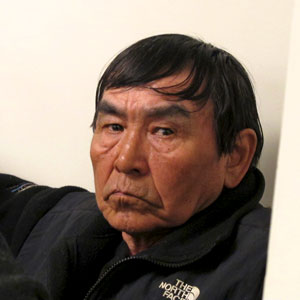
Nearly 50 fishermen were cited for illegal salmon fishing last June. Half of them pled not guilty and have been fighting it in court ever since.
In recent weeks, the fishermen had been waiting to hear a decision on whether they have the religious right to subsistence fish, even during state closures.
The trial resumed May 20 in Bethel and the fishermen packed into the courtroom with some people left standing in the hallway. It was a trial by judge and Judge Bruce Ward, in a gentle voice, said the court found that the state’s need to restrict King salmon supersedes the fishermen’s right to religious practice.
“The court wants all parties to know that this was a very difficult decision to make,” Ward said. “This was not easy.”
The fishermen were challenging the state based on a free exercise clause of the Alaska constitution, arguing that subsistence fishing is a religious practice and that when they fished last summer during closures, they were practicing their religion.
Judge Ward said he did a lot of research, including looking at an older case, Frank vs. the State, which was decided by the Alaska Supreme Court in 1979. That case shows that the free exercise clause may work when three things are met: 1) religion is involved; 2) the conduct is religiously based; 3) the person is sincere.
The judge found the defendants met the first two, no problem. It was obvious from the expert testimony the court heard on Yup’ik culture. The sincerity question would be addressed later by each individual trials.
The sticking point came when Western science entered into the argument. Based on the testimony given by state and federal fish biologists last month, the court decided that there is a compelling need to restrict the Kuskokwim King run based on recent data. Where in the Frank case, it was about the need to take one moose for a ceremonial potlatch, which wouldn’t have affected the population of moose, in this case the fishing could have had an adverse affect.
“Therefore, this court finds the need to police the Chinook run to ensure its continuity for future generations of Yup’ik fishermen and families overcomes the argued for free exercise exemption which would otherwise apply,” Ward said.
Although each case must be heard separately for the court to determine the fishermen’s sincerity, Judge Ward said those finding won’t sway his guilty verdicts.
That held true in the first trials against fishermen Felix Flynn and Peter Heinz. Both had their nets seized last summer and both got emotional on the stand. Felix Flynn wiped tears away saying that it had been hard answering questions from his young grandson.
“He asked me, when are we going to check the net,” Flynn said, “I couldn’t say nothing…because we didn’t have no net out there…because he witnessed me when we set the net. And that’s really painful.”
So far, the court is finding that all the fishermen were sincere in their religious beliefs but is finding them guilty anyway. Most are being sentenced $500 dollars with half of it suspended and put on probation for one year.
The defense, led by James Davis Jr. with the Northern Justice Project, plans to appeal, and the judge says the Alaska Supreme Court should review the Frank case.
“I think the Alaska Supreme Court needs to address some of the parameters that was outlined in Frank 40 years ago,” Ward said. “It’s been a long time and the situation in this case is very different for a number of reasons.”
At some point during the proceeding, the courtroom was infused with the smell of dry fish as someone in the gallery passed around a gallon baggie full of it, sharing it with everyone.
The individual trials will continue at the Bethel Court House until all remaining fishermen are heard.




